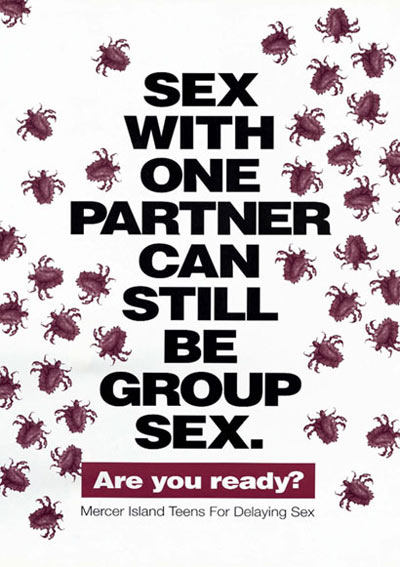STDs/HIV
 STD stands for Sexually Transmitted Disease and the statistics are astounding!
STD stands for Sexually Transmitted Disease and the statistics are astounding!
1 in 4 sexually active teens will get a sexually transmitted disease every year!
Some of these diseases will have lifelong consequences.
STDs are spread through sexual intimacy with an infected person.
BACK TO TOP
The Washington State Department of Health offers an excellent introduction to STDs. We would highly recommend reading this booklet to learn more about STDs.
The booklet describes:
Check this booklet out to learn the basics about STDs and the various types of common STDs that are currently of concern.
BACK TO TOP
Some STDs have symptoms that can be recognized but many have mild symptoms or no symptoms at all! Itís very possible to have an STD and yet be totally unaware of this fact.
Fact: We know that many STDs can cause serious problems if they are not treated. This is why testing is so very important.
Fact: Having one STD can make it easier to get another one.
When considering the importance of testing and testing early, think about HIV as an example here. A person can be infected with HIV and not be at all aware of this for a very long time; for some, this could even be as long as 10 years. Yet with testing, HIV can be discovered early. While there is currently no cure for HIV/AIDS, treatment is making longer and better quality of life now possible
See the Department of Health booklet (hyperlink) for information about testing and treatment for several common STDs and HIV/AIDS.
BACK TO TOP

One of the things that you need to discuss with your teen is the fact that whenever a person has sex with a partner, (s)he is potentially also having sex with all that partnerís previous partners. The potential for contracting an STD continues to increase as the numbers of partners increase.
A group of teens designed a poster to depict this issue in a more graphic way, using a parasite that they found particularly disgusting to illustrate their point.
It is highly recommended that partners considering becoming sexually active go and get tested first and then wait for the results before taking this very important step. Once they have completed testing, then itís important, of course, for each of them to stay faithful to that one partner and use protection each and every time they have sex.
If waiting didnít happen, it is very important that both partners go for testing and, if required, treatment.
If your son or daughter receives treatment, itís also important to stress that this treatment does not guarantee that they are now immune to getting the STD again. Itís very important to use protection as a preventive measure if they are going to continue to have sex.
Stress to your teen that re-infection is always a possibility, and treatment will once again be required should re-infection occur.
Read the section on Safer Sex and emphasize to your teen the importance of using protection each and every time they have sex.
BACK TO TOP
 STD stands for Sexually Transmitted Disease and the statistics are astounding!
STD stands for Sexually Transmitted Disease and the statistics are astounding!1 in 4 sexually active teens will get a sexually transmitted disease every year!
Some of these diseases will have lifelong consequences.
STDs are spread through sexual intimacy with an infected person.
- Weíre not just talking about vaginal sex here!
- You can also get STDs from having oral and anal sex. (This is important since many teens think that you are safe if you have oral or anal sex.)
- It should be noted that some STDs can be spread through skin-to-skin contact.
- HIV can be spread by vaginal, anal and oral sex and also by sharing needles.
BACK TO TOP
The Washington State Department of Health offers an excellent introduction to STDs. We would highly recommend reading this booklet to learn more about STDs.
The booklet describes:
- How STDs are spread
- How they can be treated
- Most importantly, how they can be prevented!
Check this booklet out to learn the basics about STDs and the various types of common STDs that are currently of concern.
BACK TO TOP
Some STDs have symptoms that can be recognized but many have mild symptoms or no symptoms at all! Itís very possible to have an STD and yet be totally unaware of this fact.
Fact: We know that many STDs can cause serious problems if they are not treated. This is why testing is so very important.
Fact: Having one STD can make it easier to get another one.
When considering the importance of testing and testing early, think about HIV as an example here. A person can be infected with HIV and not be at all aware of this for a very long time; for some, this could even be as long as 10 years. Yet with testing, HIV can be discovered early. While there is currently no cure for HIV/AIDS, treatment is making longer and better quality of life now possible
See the Department of Health booklet (hyperlink) for information about testing and treatment for several common STDs and HIV/AIDS.
BACK TO TOP

One of the things that you need to discuss with your teen is the fact that whenever a person has sex with a partner, (s)he is potentially also having sex with all that partnerís previous partners. The potential for contracting an STD continues to increase as the numbers of partners increase.
A group of teens designed a poster to depict this issue in a more graphic way, using a parasite that they found particularly disgusting to illustrate their point.
It is highly recommended that partners considering becoming sexually active go and get tested first and then wait for the results before taking this very important step. Once they have completed testing, then itís important, of course, for each of them to stay faithful to that one partner and use protection each and every time they have sex.
If waiting didnít happen, it is very important that both partners go for testing and, if required, treatment.
If your son or daughter receives treatment, itís also important to stress that this treatment does not guarantee that they are now immune to getting the STD again. Itís very important to use protection as a preventive measure if they are going to continue to have sex.
Stress to your teen that re-infection is always a possibility, and treatment will once again be required should re-infection occur.
Read the section on Safer Sex and emphasize to your teen the importance of using protection each and every time they have sex.
BACK TO TOP